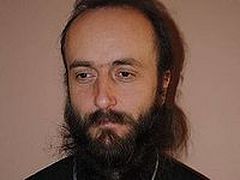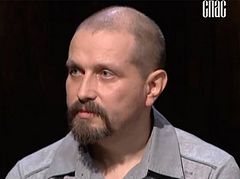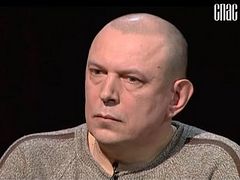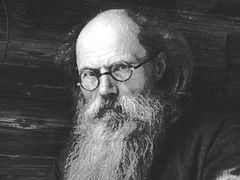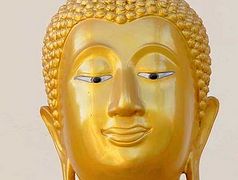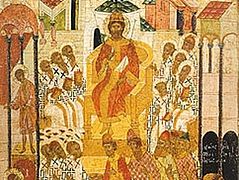We continue to publish the materials of Spas TV program My Path To God where Priest George Maximov interviews people who converted to Orthodoxy. Today Father George will discuss with hieromonk Diomedes (Lukyanyuk) such questions as why people become monks, can obedience be the reason for monks to go into schism, how to avoid the temptation of going into schism, what is monastic renunciation of one’ own will, and whether there is a difference between Greek and Russian monasteries.
Priest George Maximov: Hello! You are watching My Path To God. The guest of today’s program is hieromonk Diomedes (Lukyanyuk). This is the first time that we have a monk in this studio, so I hope that we can discuss monasticism today.
Father Diomedes, how did you start your spiritual quest? What directed you toward God?
I was about seven years old, when I heard about the end of the world and the Last Judgement, so I kept on asking my mother, “Why do we live?”
Hieromonk Diomedes (Lukyanyuk): I grew up in Moscow, in a family of non-believers. My parents were well-educated doctors somewhat interested in spiritual matters. My grandmother was into all sorts of esoteric books and probably attended some esoteric meetings. Eventually, her spiritual quest led her to the Church. Although she took me to the church several times, she didn’t tell me much about Christianity. Frankly, I wasn’t really interested in it when I was a child. However, I do remember one episode: I was about 7 years old, when I heard about the end of the world and the Last Judgement, so I kept on asking my mother, “How could it be? Why do we live? Why is it going to be like that?” My mother could not answer my questions. So you can say that I had some inclination for spiritual quests even when I was a child.
Father George: What was the first thing you found during that quest? It is no secret that in the 1990s our country was overrun by an excessive number of various teachings. Many people could not find the direct and clear path to the Church at that time. Did it happen to you too?
Father Diomedes: Yes. I read many books on various Eastern religions and prior to becoming Orthodox, I was into Buddhism. In one of the books, I read that Buddhism negates the existence of the personified God, so I started studying and practicing this concept. To do this, I had to overcome the perception of God as a Personality that I believe is inherent to every person. I had to suppress that thought in myself to advance in my Buddhism practices.
Later, when I had already forgotten about that denial of God and thought that I found the Truth, I heard from a respected man that some Buddhists, and specifically people from my community, were converting to Orthodoxy. This thought stuck in my mind. Shortly after that, I met a religious woman who was working on social adaptation of young people. When I met her, I remembered the words Pontius Pilate said about Christ, Behold the man (John 19:5). I thought that she was a great person and felt the desire to follow her. She opened the world of Orthodoxy to me and led me to Christ.
Father George: Was your separation from Buddhism painless?
Initially, I wanted to reconcile Buddhism and Christianity.
Father Diomedes: While I was in the Buddhist community, many concepts became deeply embedded in me. That is why the process of purification and re-structuring took years. Even after I became a monk, occasionally I would remember some elements of the Buddhist teachings that contradicted the Orthodox teaching and the teachings of the Holy Fathers. Initially, I even wanted to reconcile Buddhism and Christianity. I was sure that all religions are good for us and lead us to God. It didn’t even matter to me that Buddhism taught that God was nonexistent. I thought that Christianity and Buddhism—or any other religion—could be reconciled. However, my monastic life gradually overpowered the concepts and ideas I got from Buddhism.
Father George: Some elements of Buddhism, especially Tibetan Buddhism, seem to be similar to what we have in Orthodoxy as they do have monasticism, asceticism, self-denial, prayer ropes, iconography, fasting, etc. Looking at it superficially, people can say, “Look, there are so many things in common!” However, if you look deeper into it, you can see right away that deep down there are significant differences. The underlying principles of Christianity and Buddhism—just like the goals people try to achieve in Buddhism and Christianity—are diametrically opposed.
Father Diomedes: For me the goal of Buddhism was to achieve emptiness. According to its main dogma, people suffer while they exist and non-existence is the relief from suffering. While Orthodoxy teaches that Christ the Lord is Life. I had some experience with achieving that emptiness through Buddhist meditation. It was a fairly small experience, but more than enough for me. However, when I heard that Christ was Life, it was as though I saw a light shining for me. As Christ said, I am the way, the truth, and the life (John 14:6)—This refers to the Eternal Life filled with light and purity.
Father George: There is another significant difference. In Buddhism, as a result of this very teaching about achieving emptiness and about the illusiveness of the world, people are essentially left to their own devices. Even though there is a Buddhist community, everybody is saving themselves through their own actions. In Christianity, we communicate with Christ as a Personality. This is not merely something that we have in our minds or something that we made up; we experience it in the course of our lives as we communicate with the One Who is beyond our reach but still very real. I think you came across that too.
The need for a spiritual guide became critical for me.
Father Diomedes: Of course, The first thing that I noted when I was reading Orthodox books was the need to have a spiritual guide. This search for a spiritual guide became critical for me after Natalia, that woman who led me to Orthodoxy (we used to call her Mother Natasha), suddenly passed away from a heart attack and I learned that she had a spiritual father. When I lost the spring that initially gave me the living water of Orthodoxy, I started looking for the source of that water.
Father George: Did you manage to find it?
Father Diomedes: Yes, I met her spiritual father. Later, he tonsured me into monasticism and I spent the first years of my monastic obedience under his guidance.
Father George: We should discuss this in greater detail, because our non-churchly viewers may ask, “How does a man decide to become a monk?” People have several stereotypes: men become monks because of unrequited love, to spite the women that rejected them, or they just try to run away from the world and hide behind the monastery walls because their regular earthly life was not successful. Why did you choose monasticism? What made you think about becoming a monk?
Father Diomedes: First of all, I was probably moved by the wish to be perfect, which is inherent to every young person. I also always wanted to find my better half. However, meeting girls was not sufficient and something was always missing, for my soul was looking further and deeper into eternity and one person could not fill all that space.
I understood that my old life would be displacing that warmth I felt after confession and communion.
Once my friends and I went to Optina Monastery for Christmas. This was the first nighttime service I attended. We travelled from Moscow and the day of the trip was very difficult. However, on the way back, when we approached the Moscow Ring Road, I suddenly felt some kind of warmth in my heart, some feeling I never felt before. Behind the Moscow Ring Road, I saw the Second Medical University that I wanted to apply to, following the footsteps of my parents to become a doctor. Suddenly, in my heart I saw my routine life, classes in the university, joyless weekdays… And I understood that my old life would be displacing that warmth I felt after the service, confession and communion. Probably from that moment on, I got that desire to change my life and create the conditions that would help me preserve this warmth. Today I’d call it the warmth of God’s grace, but at that time I didn’t understand it.
I brought a book about the Jesus prayer from Optyna Pustnyn, and when I started reading it, I understood what the Holy Fathers and the Church teach us about preserving God’s grace and about the perfectness of the gift of grace we receive in church through the Sacraments. This was how my journey began.
Father George: Your parents were probably surprised by your decision, weren’t they? I know many monks, but I can’t think of an example when the parents accepted this choice of their children with understanding. How was it in your case? How did you tell your parents that you decided to fully dedicate your life to God?
Father Diomedes: There was a change in my relationship with my parents, when our family read the book “What Do They Want To Save Us From?” that describes some people’s encounters with evil spirits. Before I read that book, I thought that the word “demons” was an allegory describing some sort of dark energy, some actions or thoughts of people. This book told my parents and me that they were real beings. That was when the need for some spiritual enlightenment, reinforcement and development became important for my parents. Although, of course, it was not as important for them as it was for me.
Half a year after my trip to Optina Pustyn, my parents, my younger brother and myself visited Father Mikhail, my spiritual father, who lived in Krasnodar diocese. I have not told my parents about my intention yet, although I have already made up my mind about staying at the monastery. With God’s help, with that convincing assuredness that God gives to people under spiritual guidance and people who righteously live their lives by the grace of the Word of God, my words sounded so convincing that after overcoming some anxiety and talking to my spiritual father, my parents let me do what I thought was right. Later on, they visited me in the monastery several times. After a while, they became more religious and even had a church wedding.
Father George: Did choosing monasticism get you closer to that perfection you yearned for?
“If people knew about the bliss that monks experience during their journey… everyone would become monks.”
Father Diomedes: Yes. I never regretted the path I chose. There is no better way to explain my thoughts about it than to quote from a book of the Holy Fathers. In that book, when asked what monasticism was, an elder answered, “If people knew how hard a monks’ journey was and how difficult were the obstacles that they encounter on their way, not a single person would become a monk. However, if people knew about the bliss, pureness and joy that monks experience during their journey, then all people would instantly drop everything and become monks.” For me, monasticism is a path between two opposites: hard work, suffering and struggle on one hand and God’s grace on the other hand.
Father George: You were also ordained into priesthood. Many people think that priests’ lives are a constant stress because they have to listen to distressing things during confession. So sometimes people consider this a heavy psychological burden. What do you think? Is this an unbearable burden or does God help you somehow to carry it?
Father Diomedes: According to the Holy Fathers, if you have an inseparable connection with Christ and are full of grace, as you are supposed to be, then all sorrows disappear. We only experience stress when we have unconfessed sins. So if you are at peace, you will be sharing your peacefulness with others, and people that come to you with their sorrows will get consolation from you. Like a holy oil, it will flow to the hearts of people you confess or talk to. For me, as for any monk, the main purpose of life is purification of my heart. When we attain God’s grace, Christ bears all our sorrows.
Father George: Could you tell us about that period of your life, after you became a monk and were ordained, when the abbot of your monastery went into schism and you followed him. This is not a unique occurrence. Things like that do happen. Some clerics, under a pretext of some violations that they think their bishops have committed, depart from the Church and found their own churches. In that respect, your experience of overcoming this temptation could be very useful. What made you make that choice and follow it for a certain period of time?
Father Diomedes: My decision was based on my wish to fulfil my monastic debt of obedience to the abbot. After I made that decision, I saw my descent. Based on the state of my heart, I understood that my decision was wrong. So two weeks after being in schism, I spoke to my Metropolitan asking him to accept my repentance and take me under his spiritual guidance.
Father George: What made your abbot go into schism? How did he explain it?
Father Diomedes: As a gifted person with a strong character, our abbot was always looking for some independence. This was very helpful for his spiritual journey. However, as time showed, it also became an obstacle to his healthy life within the Church. He joined one of the schismatic communities that separated from the Russian Orthodox Church Outside of Russia in the 2000s. I think that this community was dominated by the spirit of judging. They were constantly judging, rejecting the official church authority, finding fault, etc.
I understood that there was no love in the schism. When you fall for it, you don’t even notice that you are losing the most important thing—you are losing Christ.
Before going into schism, our monastery was very involved in the campaign against Taxpayer Identification Numbers and electronic passports. Also, many comments against the church hierarchy were made. When the sprouts of this schism started to take root in our monastery, we split into camps. Our camp and their camp. There was the official Church of the Moscow Patriarchate and we were allegedly the true Russian Orthodox Church. I understood that there was no love in this. When you fall for it, you don’t even notice that you are losing the most important thing—you are losing Christ, because where the Spirit of the Lord is, there is liberty (2 Cor. 3:17), there is love and the unity of the Spirit in the bond of peace (Eph. 4:3). He is looking for the good in people, looking for their good qualities that He can unite with. When people promote division into the pure and the impure, the right and the wrong, these are the signs of spiritual deception. Unfortunately, these signs became obvious to me only after I made that decision. But I was following the instructions of the Holy Fathers that you need to be obedient till the day you die.
Father George: This, of course, is not applicable to cases when your spiritual mentor wants to lead you away from the Church and into heresy or schism.
Father Diomedes: Of course.
Father George: I once talked to some priests who wanted to go into schism. I tried to talk them out of it, but, unfortunately, they still did it. There weren’t too many of them. One of them, thank God, later repented and returned to the Church. The others didn’t. But I remember that when I corresponded with one of them, while he was formally still in the Church, he gave me all those standard schismatic arguments, like “there is the heresy of ecumenism, deviation from faith,” and that is why he had to quit. However, these arguments are without merit, because the 15th Canon of the First-Second Council of Constantinople (861) does not state that a cleric should create his own Church if his bishop is plainly uttering heresy, it states that such cleric should go to another bishop of the same Church who does not support this heresy. According to the same Canon, remembering the archpriest in prayers can only be discontinued, if he openly professes the heresy that has already been condemned by the council. However, our schismatics make up the heresies that were not condemned by any council and use them as a pretext for breaking away.
So I showed to this cleric how inconsistent the schismatic arguments are. Interestingly, he agreed. He wrote, “Yes, I have nothing to say. This was the most serious answer I ever received. But can’t you feel how rotten everything is in the Moscow Patriarchate, how everything stinks here and how bad the people here are? How can I stay among these people?” There was no trace of love in this, only some kind of satanic pride and disgust with his neighbours. Unfortunately, that man did not notice it.
When you read the texts written by schismatics, you see right away that they are consumed by the spirit of judging and need something to feed that spirit.
I remember what St. Augustin said about the commandment, “These things I command you, that ye love one another” (John, 15:17): “He who followed these words will not go into a schism.” When you read the texts written by schismatics, you see right away that they are consumed by the spirit of judging and need something to feed that spirit, and find some reasons to say, “See how bad they are!” to justify their sinful act.
What helped you to see the error of this way? In addition to what you’ve already mentioned, was there any event that inspired you to break away from the schism?
Father Diomedes: There was a combination of signs. For wherever grace and love fades, various passions, vice and deceptions creep in. So your heart feels that there’s something wrong.
When the diocese learned that our monastery wants to separate from the Moscow Patriarchate, the Metropolitan came to our monastery with two priests to talk to our abbot. I participated in that meeting. The conversation was very simple and open and I clearly saw how inconsistent our abbot’s arguments were and how different his spirit was from the image that I initially followed.
The Metropolitan made us question our actions to a certain extent, when he said, “If I sent an official letter to your monastery prescribing you to believe in something that contradicts the teaching of our Church or profess heresy, you would have been right. And if you ever receive such a letter from me, I give you my blessing to leave me and go to a different bishop. But this did not happen. And remember, that even if I receive such a letter from my superior prescribing me to spread false teaching in my diocese, I, as your bishop, have the authority not to follow that order and not to distribute that letter to anybody.” I saw that he was very open to discussing the problem. And that image of the Metropolitan, which lingered on after he left, helped me to come back and go to him with repentance, asking to accept me back into the Church.
Father George: I hope to God that those people who are still in schism would see what you saw. Some priests I know told me that when they went into schism for a certain time their spiritual life became considerably worse and that they were in a state of some kind of deception, when no arguments would ever convince them. Only the special, blessed influence of other people’s prayers later helped them to come to their senses and understand their situation.
I wanted to ask you another question. You spent many years in Russian monasteries, and now you are in a Greek monastery. How do you compare the monastic way you saw in our monasteries and the one you saw in Greece? We are not discussing this to praise or criticize anybody. I would simply like to hear about your experience. It is important, because at the time of persecution in Russia parish life was preserved, thank God, but all monasteries, except one, were shut down. That is why monastic life in our country is still it its formative stage. This is very different from Greece, where, thank God, the monastic tradition continued uninterruptedly for many centuries.
Father Diomedes: It would be difficult for me to compare. I can say many good things about Russian monasteries and Russian monasticism. Just as people differ from one another, there are differences between monasteries, both in Russia and in Greece.
For a monk, the best monastery is the one where he finds Christ and his spiritual father who would lead him to Christ. I found my spiritual father in Greece and he kindly accepted me in his monastery. I think the main thing that I would like to say specifically about the Greek monasticism is that the ancient understanding of monasticism and the concept of monastery as a close-knit community that is guided by the heart and mind of the spiritual leader is alive in Greece, both on Athos and in the mainland.
Why did I go to Greece? I was very impressed by the book of Elder Archimandrite Aimilianos (Vafeidis) where he described the revival of monasticism in the 1970s, when monasteries in Greece were given a certain autonomy within the Church. That is, the monastery is fully controlled by its abbot and nobody can send any monks there or withdraw any monks from the monastery. Everything is happening only in consultation with the abbot and with his blessing. The abbot is elected by the monks. Such unanimity makes it possible to form a spiritual family where there is no segregation.
For me, a spiritual father is not the one who tells you what to do, but the one whose blessing liberates you from your passions. His guidance gives you the freedom from your own will, which, as the Holy Fathers teach us, is contaminated by sin. When you trust your spiritual father and his blessing, you are freed from the worries and thoughts that often bother us. When we tell everything to the spiritual father, we make space for Christ and prayer in our hearts. And when there are no obstacles to praying, prayer naturally thrives in people.
For me, one of the most cherished feelings in monasticism is the feeling of family.
For me, one of the most cherished feelings in monasticism is the feeling of family. As a spiritual child of the abbot, you feel a unity with him in the Spirit, you feel spiritual closeness, no matter where he may be. All people are perceived as family. Surprisingly, I see that through this way of life people I don’t know become closer to me.
Father George: I’d like to clarify for our viewers that concept of denying your own will. This concept is inherent not only to monasticism, but to the spiritual life of Christians in general. For a secular person this might sound strange and even wrong, for it sounds as if you have to lose your will or become brainwashed. But here the issue in question is totally different. The thing is, our will is contaminated by sin and needs to be cured. Every Christian understands that they must conquer their passions and that pride is the main passion. Venerable Paisios of the Holy Mountain said, “Pride is the fortress of all passions in the soul of man. If you can conquer this fortress, it will be easier to overcome other passions.”
But how do you overcome your pride? Through humility, of course. However, how can you be humble, if you yourself decide when and how are you going to be humble? Are you humble at all, if you are simply fulfilling your own will? The will that is contaminated with sin? If you always listen only to yourself and you are the ultimate authority for yourself, how can you get rid of pride, self-importance and vanity? This would be simply impossible. Even if you pretend to be humble or accept unpopular obedience, for example undertake to do some messy work, or say some depreciatory words about yourself, this is not true humility, because you yourself decided to do it and are doing it for your own sake. In this case, your will is not cured from pride. That is why it is so important to have a spiritual father, for through our obedience to him and our trust in him for the sake of Christ we purify our will and truly break the habit of thinking that we always know what is best. It is important not only for the monks, but for laity as well.
Thank you very much, Father Diomedes, for your story. I hope to God that people who are at the crossroads now and are away from the Church would find the path that would lead them to God.


